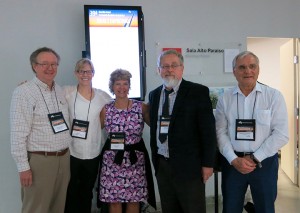
Photo courtesy of Resa Kelly
Chemistry Professor Resa Kelly, second from the left, presented research on using visual animations in teaching chemistry this summer. Here she is pictured with colleagues at a meeting in Brazil.
A group of San Jose State University professors who work in the College of Science as part of the Science Education Program is offering their support to faculty who are interested in incorporating high-impact practices into their curriculum to support student success. Ellen Metzger, the director of the Science Ed Program and a professor of geology, attended a summer workshop on high-impact practices at the University of California, Los Angeles.
“It helped me understand the practices better and I am really grateful to be part of a team that is developing sustainable and interdisciplinary tools,” she said.
The Science Education Program also includes Resa Kelly, a chemistry professor, Cassandra Paul, a physics and astronomy professor, and Elly Walsh, a meteorology and climate science professor. The four are versed in curricular design, transformation and evaluation along with using technology to design and study learning. As part of SJSU’s Four Pillars of Student Success, high-impact practices are recommended to increase student engagement and help to clear bottlenecks in key courses.
Kelly began her teaching career at the high school level and is particularly interested in helping students make the transition from high school to college-level chemistry. Chemistry is a prerequisite for some majors that often causes a bottleneck due to a higher rate of failure or withdrawals than the average across other courses.
Using a grant from the National Science Foundation, Kelly’s research is aimed at developing visualizations to boost deeper learning. She has worked with SJSU animation artists and computer science students to create short videos about the atomic level details of chemical reactions where the outcomes conflict.
“The overall goal is that we shouldn’t tell students which animation is right or wrong,” she said. “We want to connect them to the evidence and hope over time, with practice, they will be able to justify why one model is preferred over another.”
Walsh is currently involved in research on understanding and supporting student engagement in socially controversial scientific issues, such as climate change causes and impacts. Paul is a member of the Physics Education Research group. She has experience in investigating the interactions between students and instructors in interactive classrooms and helped develop the Real-time Instructor Observing Tool (RIOT).
Metzger said the Science Ed team is particularly hopeful that plans for an interdisciplinary science building will allow them more opportunities to collaborate with colleagues from other colleges.
“Research has shown project-based learning and instruction is effective,” she said. “We need to think of innovative ways to be interdisciplinary.”
She also noted that project-based learning offers an opportunity for students to feel connected to their community.
“The key to equity is engaging students of all types in their learning,” she said.
Stacy Gleixner, interim AVP for Student Academic Success, and Amy Strage, AVP for Faculty Development and director of the Center for Faculty Development, also attended the summer workshop on high-impact practices. They are developing easy to implement “Faculty Matter” tips that are sent to all faculty weekly by email and archived on the Academic Spotlight blog.